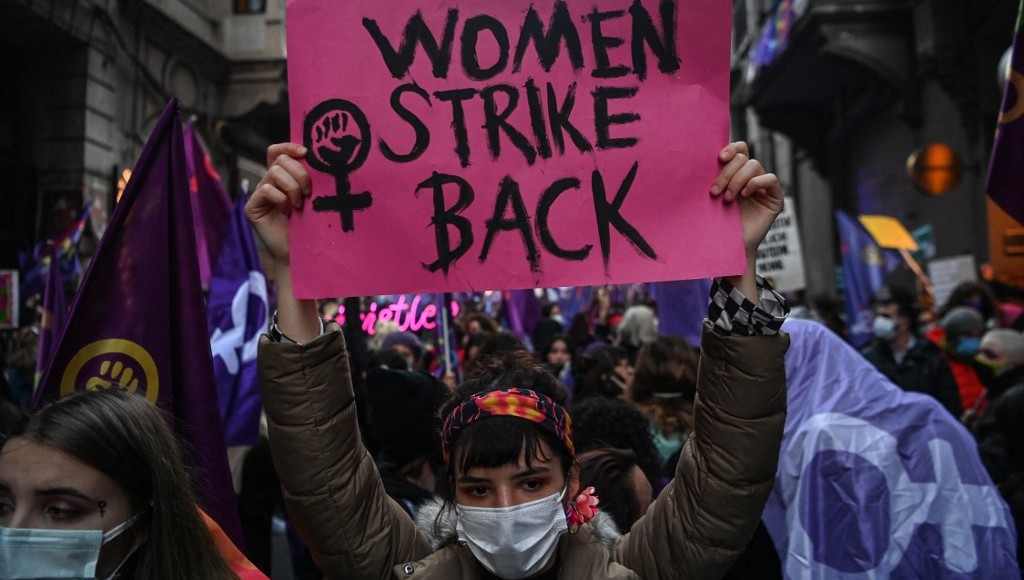Thousands of women came together in İstanbul to demonstrate against a wide range of problems concerning women’s rights in Turkey and the murder of at least three women over the weekend, the Stockholm Center for Freedom (SCF) reported.
Hanım Pınarlı (92), Fatma Kovan (26) and Reyhan Korkmaz (38) were viciously killed by men, which has drawn public attention to femicide, violence and the inadequacy of law enforcement in ensuring that the perpetrators face legal consequences. Femicide has long been the main problem on the agenda of women’s rights activists.
According to a report published today by Sezgin Tanrıkulu, a human rights defender and deputy from the Republican People’s Party (CHP), nearly 7,000 women have been victims of femicide during the 18 years that the Justice and Development Party (AKP) has been in power.
The report said one of the main reasons for the increase in deaths was because women were not taken seriously by law enforcement when they complained about violence. “Women go to the police and file a complaint against their partners after a violent incident,” said the report. “However, instead of taking the necessary legal steps against the perpetrators, the authorities act as conciliators and try to reconcile the partners.”
For the sake of keeping the family together, authorities brush off allegations of violence and condemn women to live with violent partners.
Turkish women have complained about the incompetence of the police in ensuring their protection. They have said restraining orders were often violated by their partners with the knowledge of the police.
The report verified these accounts, saying that there were serious flaws in the judicial system because effective investigations into allegations of violence were not carried out. Moreover, men who were convicted of violence or femicide were either let go on probation or benefitted from a reduction in sentence.
Vulnerable women do not feel supported by the state, as there are only 3,482 women’s shelters in Turkey, whereas women account for 40 million of the total population. This means there is one shelter for approximately every 10,000 women.
Having no place to escape or an effective support system, women are compelled to live with abusive partners. Activist women pointed out that only this week a mother was brutally beaten by her ex-partner in the middle of the street in front of her 5-year-old daughter. The incident, which took place in the northern province of Samsun, caused an outcry on social media. Although the perpetrator was immediately detained, activists have pointed out that in most cases when violence happens behind closed doors, the offender goes without punishment. Unfortunately, violence often leads to murder.
Dilber Sünnetçioğlu, from the Women’s Platform Against Femicide (Kadın Cİnayetlerini Durduracağız Platformu), said the only way to protect women was to effectively implement the Istanbul Convention, a Council of Europe treaty designed to prevent violence and domestic abuse against women.
There have been discussions within the government and among conservative journalists concerning a possible withdrawal from the Istanbul Convention. They have been criticized the convention, saying it undermined traditional Turkish values.
Amnesty International warned on August 5 that Turkish authorities should fully implement the Istanbul Convention rather than withdraw from it. Female writers in Turkey have also issued a statement demanding that the convention be fully implemented.
One of the principles of the Istanbul Convention is to ensure equality between genders in all walks of life, and equal pay is essential to establishing equality. Women also protested unequal pay at today’s demonstration.
Tanrıkulu’s report said that empowering women economically was an important step in ensuring their safety and well-being.
According to the report the pay gap between genders has increased over the years, and men are now paid 31 percent more than women. In comparison men were paid 21 percent more in 2019, and 12 percent more in 2006.
Accordingly, women are not very visible in leadership positions. The Directorate General for Women’s Status said men dominated leadership positions in the bureaucracy, with 88.62 percent of the total.
The rights of female inmates were also covered in Tanrıkulu’s report. There are currently 17,000 women in prison and 800 children under the age of three.
A separate report has said that prison conditions were dismal and the basic needs of children and babies, such as milk and toys, were not provided.
In addition to these problems, women in prisons have been subjected to sexual harassment and unlawful strip-searches. Opposition deputies and activists have argued that prison administrations do not follow protocols in strip-searches and that these searches have become a means of subjugation. Many women have spoken out about their experiences and said they felt humiliated and violated during prison searches.



